#pro qui gon
Text
So my We Need to Talk About The Jedi Eldritch Jedi fic is being written, but there are so many things I want to do! I need help deciding!
I want to start with ya boi Qui, since I love him as a character and as a Jedi (Qui-Gon Bashers can fuck right off my blog, thanks), and this will determine his role as a central presence!
#writing wip#star wars#obi wan kenobi#pro jedi#star wars prequels#qui gon jinn#tcw#eldritch jedi#fanfic#star wars fanfiction#wip#darth vader#trope bingo#vote for tropes#sw tcw#fanfiction tropes#Jedi enthusiast#there will be hints of codywan#we love qui-gon jinn#pro qui gon#star wars anakin#Ahsoka#jedi appreciation#star wars canon#star wars legends
17 notes
·
View notes
Note
Hello! I know you’re generally a pro Jedi blog that’s focused mostly on the other Jedi, and you seem mostly only ambivalent towards Qui-Gon, but I was wondering if you know of any pro Qui-Gon blogs or even just any content about him? Everywhere I’ve looked I’ve just seen bashing and I feel so alone in this fandom. It seems as if no one else likes him like I do.
Hello There!
Thank you for reaching out to me, though I'm a little stunned by your question. In my experience within this fandom Qui-Gon Jinn is very popular and tends to get a pass for many of the things he did in TPM that if any other character had done they'd be raked across the coals. So for me, I tend to find more pro Qui-Gon fans than not in SW fandom.
But, if you are only looking at strictly Pro-Jedi blogs you will likely find writers such as myself who do point out Qui-Gon's issues mostly because we are constantly having to defend the Jedi (the Council especially) from die hard Qui-Gon fans.
But that doesn't make me "hate" him and I think we all need to remember we can still like a character even if we don't agree with their actions.
I do wish I had specific Pro Qui-Gon blogs to recommend to you, but if you follow Qui-Gon hash tags I'm sure you'll find some!
But, I'd always love to chat about Qui-Gon if you ever wanted!!
Thanks for your ask!!

14 notes
·
View notes
Text
Anakin and Ahsoka are “pick-me’s.”
Don’t worry, I’ll elaborate.
Anti-Jedi folks will always, always, lift these two assholes up as “better than all the rest of the Jedi.”
They’ll say that they have “empathy,” and “compassion,” and that they “care about the little people and not just the politicians in the Senate”—or whatever the fuck else they wanna say—all because Ahsoka and Anakin “Aren’t Like Other Jedi™️”
Now, theoretically, you could say the same thing about Qui-Gon, Kanan, Cal, etc. except for the fact that they themselves don’t believe that.
They loved being Jedi, they viewed themselves as being Jedi, they loved their fellow Jedi and the Order. They didn’t betray their family, they didn’t blame their family for their own fucking genocide or basically call their practices stupid because “look how much better I am teehee.”
Qui-Gon, Kanan, Cal…they loved the Order and being Jedi in a way that Ahsoka and Anakin didn’t.
Ahsoka’s change is partly Anakin’s fault, since she only changed after being his padawan, but that doesn’t change the fact that now she’s so entrenched in her own ignorance that she truly believes that the Jedi brought on their own genocide because they didn’t train non-Force-sensitives.
So yeah, Anakin and Ahsoka are massive pick-me’s and y’all are too.
#star wars#sw prequels#anti anakin skywalker#anti anakin apologists#anakin skywalker critical#ahsoka tano critical#pro jedi#pro jedi council#pro jedi order#qui gon jinn#kanan jarrus#cal kestis
545 notes
·
View notes
Text
The number of times I've seen people misconstrue/misremember the Tatooine plot of Phantom Menace as "the Jedi (even though it was Qui-Gon) bought/stole Anakin" is astounding
One time I even had someone say OBI-WAN (he was on the ship the whole time) was the one who bought Anakin
This is beyond "media literacy is dead"
#wooloo-writes#wooloo writes#star wars#sw#jedi#the phantom menace#pro jedi#in defense of the jedi#qui gon jinn#obi wan kenobi#anakin skywalker
225 notes
·
View notes
Text
I’ve been reading a lot of Star Wars Novels lately but one of Rael Aveross’ lines in Master and Apprentice really stood out to me

‘We don’t choose the light because we want to win… We choose it because it is the light’
To me it very well puts together the fight of the Jedi in the Clone Wars and later, the remaining Jedi’s battle against the Empire. They could of very well of given up but they chose to keep fighting on the side of good not because they knew it was the winning side, but because it was good because it was filled with light.
It’s Rael restating Qui-Gon Jinn’s line from earlier in the novel but I prefer the more simple way Rael phrases it.
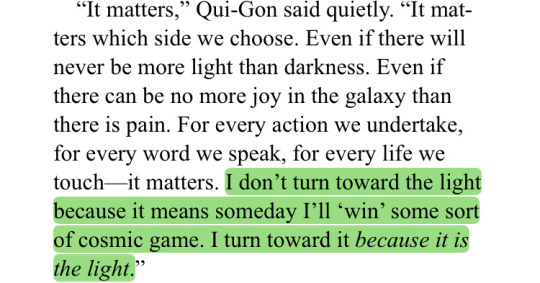
#something something the Jedi’s drive for good and light is something that can be sooo inspirational#Star Wars#master and apprentice#qui-gon#qui gon jinn#quigon jinn#qui-gon jinn#Rael Aveross#Star Wars Novels#Jedi#Pro-Jedi#ven’s thoughts
299 notes
·
View notes
Text
Jedi culture is so fascinating... I'd love a post-war everything is okay AU where we get a taste of Jedi culture. Not the clone wars-era jedi culture that we know of...but actual jedi culture. Like the one obi-wan grew up with, something ahsoka and even anakin never got to experience because of the war. Like the ones we see in the books about obi-wans padawan years, of course, combining canon and legends in a way that makes sense- maybe we can have the younger ones of the disaster lineage learn a bit about Tahl, more Tahl is always a good idea. Maybe we can delve into Mace and Qui-gon's years of padawanship and being initiates- or maybe even old jedi culture, the one Yoda is familiar with.
#star wars#jedi order#pro jedi#jedi culture#obi wan kenobi#anakin skywalker#ahsoka tano#tahl#qui gon jinn#mace windu#yoda#sw meta#alternate universe#fanfic#fanfiction#reading chancellor obi-wan by stonefreeak#cried abt jedi culture#the 'aging-out at 13' is weird though because it's literally mentioned once in legends and then contradicted and then never again mentioned#but I used to assume it's because not all initiates end up as jedi#like some realized they have other aspirations#like maybe some wanted to go to art school or uni or something#not that you can't be both a jedi and an artist#you definitely can i think
405 notes
·
View notes
Text

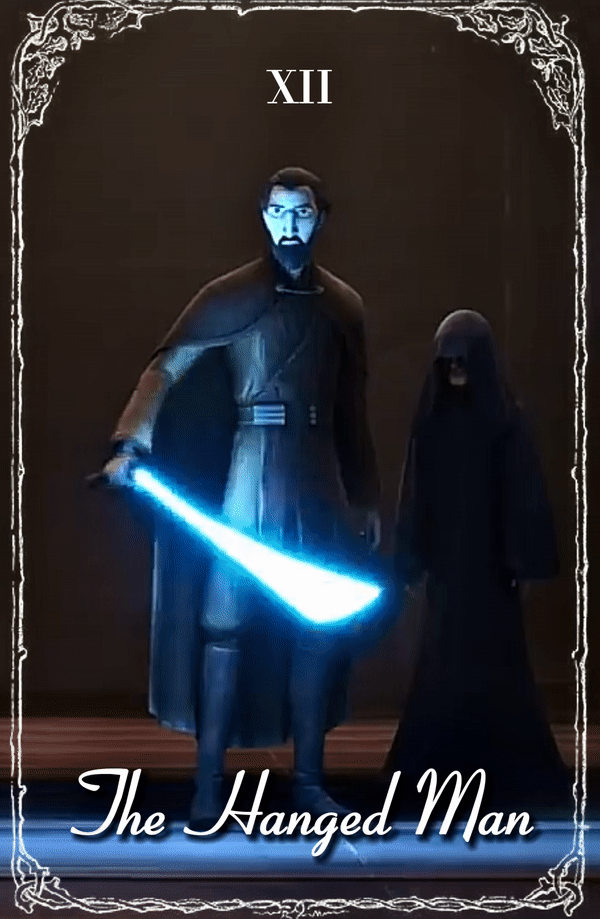
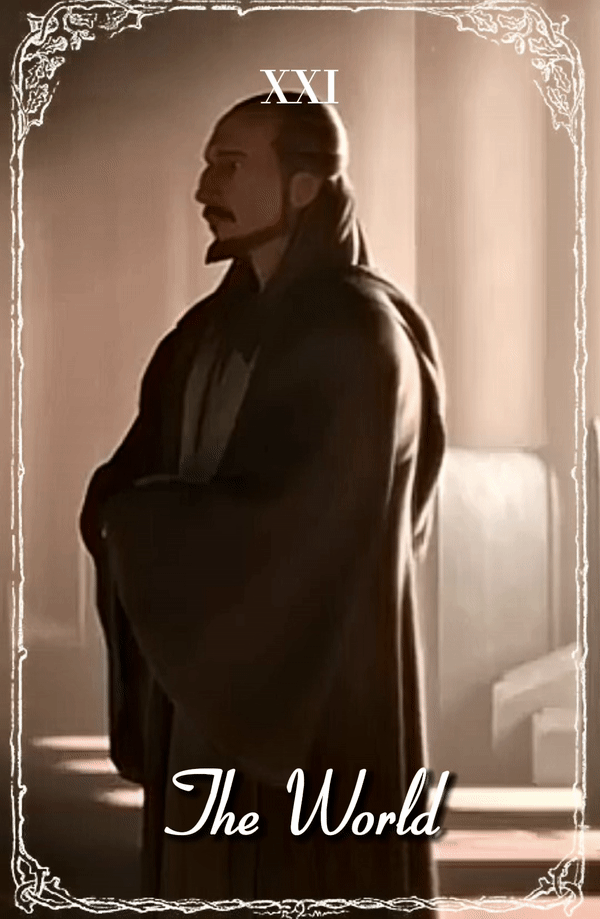
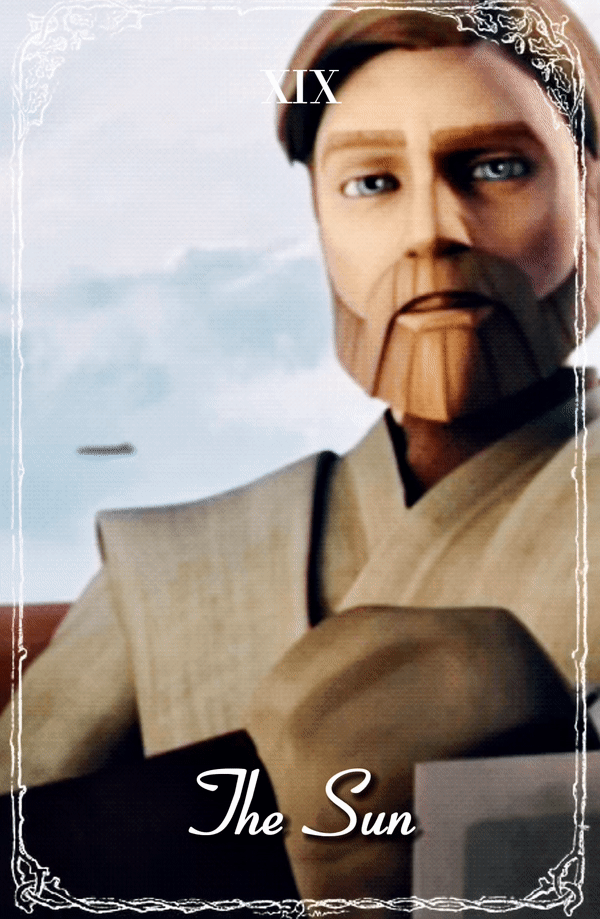
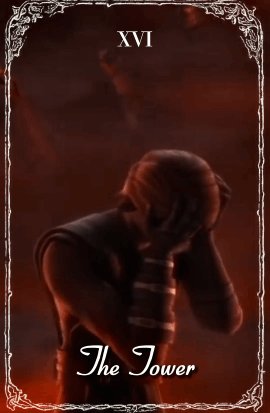

STAR WARS: THE CLONE WARS
STAR WARS: TALES OF THE JEDI
— yoda’s lineage (the “disaster lineage”) as tarot cards
#star wars edit#star wars#star wars prequels#pro jedi#jedi appreciation#yoda#count dooku#qui gon jinn#obi wan kenobi#anakin skywalker#ahsoka#ahsoka tano#* callie’s content#swsource
159 notes
·
View notes
Text
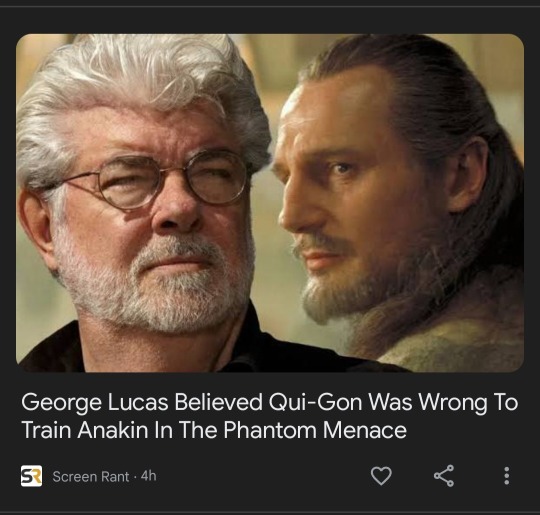
A good Screenrant article? Color me surprised.
"Most viewers assume Qui-Gon was right to believe Anakin needed to be trained - but surprisingly, George Lucas seems to think it was a mistake.
"George Lucas believed Qui-Gon was wrong to decide to train Anakin Skywalker in Star Wars: Episode I - The Phantom Menace. Many viewers see Qui-Gon Jinn as the perfect Jedi, the embodiment of everything the Order was supposed to represent. He is a rebel against the Council, alone and uncorrupted, a champion of the underdog who recognizes Anakin Skywalker's potential. The reality, of course, is that Qui-Gon is a lot more nuanced; he's as flawed as any other Jedi, and in fact, George Lucas considered him even more flawed.
"Lucas expressed his own view in an interview with Cut Magazine in 1999 (via David Talks SW). In his view, Qui-Gon shares the same faults as Anakin; he is spontaneous and reckless, with Obi-Wan Kenobi providing him a sense of balance. What's more, Lucas surprisingly suggested Qui-Gon made a mistake in insisting the Jedi should train Anakin.
"I think it is obvious that he [Qui-Gon] was wrong in Episode I and made a dangerous decision, but ultimately, this decision may be correct. The 'phantom menace' refers to the force of the dark side of the universe. Anakin will be taken over by dark forces, which in turn destroy the balance of the Galaxy, but the individual who kills the Emperor is Darth Vader - also Anakin."
"It is certainly ironic that Lucas believes it "obvious" Qui-Gon shouldn't have trained Anakin. The modern consensus is that Qui-Gon was the one Jedi who could have saved Anakin, the only one who truly understood the prophecy of the Chosen One.
"The general view is that the Jedi Council was wrong to initially reject Anakin. Lucas takes a different view, though, suggesting Anakin's training was, in fact, the mistake that doomed the order. It's fascinating to imagine how the Star Wars saga would have played out if Anakin didn't join the Jedi; the most likely scenario is that he'd have been taken in by the people of Naboo as a hero, and no doubt he and Padmé would have gotten together anyway. Padmé wouldn't have held Anakin back when he began dreaming of his mother's death, so this Anakin would never have built up the fear of loss to the cataclysmic degree seen in Star Wars: Episode III - Revenge of the Sith. Amazingly, this is probably the happiest path Anakin could have taken - and he was denied it because of Qui-Gon Jinn's choice.
Personal Note: I don't like the insinuation that the Jedi "held Anakin back" from pursuing his visions to save his mother because by his own admissions, they were just dreams. By the time he himself finally decided to do something about it, it was too late. But aside from that, I agree with everything else.
"It's significant that the will of the Force had Anakin brought up on Tatooine, a world outside the Republic, where he wouldn't be found by the Jedi. In his impetuousness, Qui-Gon insisted the Chosen One should be trained by the Jedi - but there's nothing to indicate the prophecy of the Chosen One suggested any such thing. Unsurprisingly, Lucas' perspective on the Star Wars saga is entirely convincing, even if it does run against the general view. Things worked out in the end, of course, but only after a whole lot of chaos on a galactic scale."
#it's not often i agree with a screenrant article#because usually its the worst of fandom takes#but i guess lightning strikes once in a while#it's also just nice to see someone be critical of qui-gon jinn for a change#qui-gon jinn#anakin skywalker#pro jedi#in defense of the jedi
257 notes
·
View notes
Text
It's honestly really depressing as someone who likes Qui-Gon as a character to see fanon constantly reduce him to "enlightened maverick" or "arrogant asshole" and absolutely nothing in-between or combined. Qui-Gon can be SUCH an interesting character if people would just LET HIM be an interesting character.
Qui-Gon is also, in many ways, there to move the story forward and send us a few necessary messages and that's it. He's not the main character of anything, the story isn't ABOUT him at all. Qui-Gon is there to find Anakin and bring him together with Padme and Obi-Wan. Qui-Gon is there to foreshadow the destruction of the Jedi Order through his death at Maul's hands. Qui-Gon is there to parallel Obi-Wan's own death decades later, to pass the baton of the story on to the next generation. He shows us that the Jedi are not superhuman, they're not invincible, he's there to tell us about Anakin's prophecy and introduce the theme of choices.
If you're not looking at Qui-Gon as a character there to get across certain messages and as a catalyst for the rest of the story, you're probably missing the point of Qui-Gon and looking for things that quite simply aren't there to see. It's not that Lucas was such a terrible writer that Qui-Gon can only be distilled down to "enlightened maverick" or "arrogant asshole," it's that you're probably just missing what Qui-Gon's character is actually there to DO. Lucas allows Qui-Gon to be more stable as a character because he has to keep moving the story forward around all of the other characters who are growing and changing. Qui-Gon represents the Jedi as a whole throughout The Phantom Menace, he is our first true introduction to what the Jedi are like during this golden era when the Jedi are still doing fairly well. We know Obi-Wan and Yoda when they've both been in exile for ages and they're very old, and Obi-Wan in The Phantom Menace is still a student. So Qui-Gon is the first true Jedi Knight of the Republic in his prime that we ever get to see and know. He shows us their strength, their wisdom, their abilities, their compassion. And then he dies. Not because Qui-Gon did anything particularly wrong, but just because the Sith he was fighting managed to outmaneuver him.
So by looking at Qui-Gon as nothing more than an arrogant (sometimes abusive) monster or an enlightened maverick, you're sort-of just glancing over the whole point of Qui-Gon and reducing him to something less than what he's actually intended to be which is representative of the Jedi as a WHOLE. Lucas is all about poetry and rhyming, he likes creating parallels and patterns between his films. Qui-Gon dies as an homage and reference to Obi-Wan's own death because that's how the wise master archetype works in fantasy. Qui-Gon dies as a foreshadowing of the destruction of the Jedi that will occur in two more movies, a destruction we all know is coming because this is a prequel story. We're supposed to see what Obi-Wan will become in Qui-Gon and even what he will SURPASS in Qui-Gon, we're supposed to see the beginning of the end in his story. Qui-Gon, much like Palpatine in some ways, is a symbol more than he is a character.
What's funny is that NO ONE says the same about Obi-Wan in A New Hope, no one claims that Obi-Wan is so badly written because he fits into a very specific archetype that he is contradictory as a character. We all just recognize that Obi-Wan falls into that character trope and accept that for what it is. But people want to make Qui-Gon into something both more and less than the archetype he exists within, and it sort-of ruins him either way.
Qui-Gon isn't perfect, but he's also definitely right about a lot of things, he's wise and intuitive and compassionate, much like the Jedi are in general. Just because there are some things he does you could question a little, at least in his method if not his motivation, doesn't mean he's any less wise or compassionate as a person. And just because he IS right about a lot of things doesn't mean that he's meant to be right in CONTRADICTION to the rest of the Order or even just the Council itself.
People need to take a step back and look at the bigger picture with regards to Qui-Gon, look at the narrative role he actually plays and the parallels he presents with the rest of the films (the ones made by Lucas).
#star wars#qui-gon jinn#jedi#jedi council#jedi order#pro jedi#jedi council respected#jedi council appreciation#jedi order respected#jedi order appreciation
171 notes
·
View notes
Text
John Brown-Qui Gon AU where he does what the anti-Jedi's all act like he (and the rest of the Order) should've done when he met Anakin on Tattooine.
-Upon realizing Watto owns slaves, Qui-Gon immediately kills him with his lightsaber or the Force in the name of liberating them. He tries to convince Anakin and Shmi to come along but naturally Shmi's terrified of this violent stranger, takes Anakin, and high tails it out of there.
-But of course there are other slaves for Qui Brown to save so he proceeds to attack the markets and start killing slavers left and right, freeing their slaves. Local guards try to stop him but they're no match for a Jedi and some of the braver slaves take up arms to help him.
-The town's starting to dip into anarchy now, word reaches Jabba the Hutt and he sends bounty hunters out into the city to find and kill the Jedi before the disturbance can become a full-blown rebellion, escalating things further.
-At this point Padme and friends all beg Qui Brown to remember why they're even there in the first place. "Please Master Qui Gon! My people need me and we're stuck on this planet!" But being the anti-Jedi's idea of what an ideal Jedi should be he ignores her and goes on to kill Jabba.
-The loss of central power causes all the gangs to erupt into a war to claim his throne, including slaver guilds who start kidnapping people in the chaos. So Qui Brown starts fighting them next. By this point Tattooine is a mess of anarchy and word is spreading outside the planet about what's happening.
-Obi-Wan tries to stage an intervention. "Master please, I hate slavery too but this really isn't the time or way!" When this doesn't work they manage to find the hyperdrive parts in Watto's old shop, which the Nabooian's use to flee, leaving Qui Brown behind to his crusade.
-The Jedi Council are all befuddled when they hear what Qui Brown did, first not believing it. They send some Jedi to check, finding him in the middle of his one-man war. "Dude, what the heck? We sent you to stop a war not start a new one!" They eventually subdue him and drag him back to Corusant where the Senate is furious with them.
-Hearings are held, the Naboo crisis becomes old news as dozens of independent systems reach out with complaints and concerns, accusing the Republic and Jedi of violating neutrality and dozens of peace treaties; this gives fuel to the Separatist movement.
-Palpatine meanwhile just kind of sits and stares in awe. "Huh, I thought this Naboo thing would be my ticket to Supreme Chancellorship... But this is even better!" He calls a no confidence vote on Vallorum for letting this happen. Upon becoming Chancellor he passes a bazillion restrictions and other means of controlling the Jedi.
-The Anti-Jedi fandom of this AU holds Qui Brown up as an example of how "dogmatic" "violent" and "shortsighted the Jedi are." "Wow look at these crazy Jedi, waging wars on neutral planets! Couldn't he have thought of a more diplomatic approach?"
Worst case scenario? Maybe, but maybe there's a reason the Jedi aren't invading planets with slavery.
#Star Wars#Pro Jedi#Jedi Order#the Jedi#Qui Gon Jinn#Qui Brown AU#With respect to the historical John Brown#Obi-Wan Kenobi#Shmi Skywalker#Anakin Skywalker#Sheev Palpatine
59 notes
·
View notes
Text
Pro-Jedi Essay On the Life and Fate of Shmi Skywalker (long post)
Many who believe that the Jedi Order had lost their way, are pointing at the life and death of Shmi Skywalker. However, their arguments are based on unexamined assumptions regarding the role and ways how the Jedi Order operates, the political and legal reality of the Galactic Republic, or founded on morals different from those depicted and advocated by George Lucas.
This is a long essay, possibly the longest I ever wrote, since each and any discussion regarding Shmi Skywalker and the Jedi Order, is the interplay of five distinct topics, con-joined and informing each other. These are:
The Paradigms of Love: Hierarchical vs. Horizontal
The Fall of the Galactic Republic: Fallen Symbiosis
Horizontal love, Anakin Skywalker and the Jedi Way
The Dark Side of "they could've free at least Shmi!
The Life and Fate of Shmi Skywalker - the Problem with "Deserving"
The Paradigms of Love: Hierarchical vs. Horizontal
One of the core lessons throughout George Lucas Star Wars, is that we need to clear ourselves from the attitude of discrimination toward others, based on feelings of distance and closeness, and that love manifests in two ways, along the same lines. On the one hand, there is love for those who’re immediately around you – your spouse, your parents, your children, your friends, and you do everything you can to protect the people that you love, against all those others outside that very tightly drawn circle. It’s driven by attachment: whether a person is within or without that circle, is determined by whether or not you find them enjoyable, agreeable, pleasant and satisfying, or whether or not they share your beliefs and opinions. We have the idea, deeply embedded into our minds, that the willingness to put people within that circle, our “personal relationships” first, and all the others who we have a bad, or no relationship whatsoever, second, is the measure of love, loyalty, commitment, affection and care.

On the other hand, there is unconditional love, that is compassion: wanting another person to be happy and free from suffering. By definition, compassion means to feel with, to suffer with and to experience with another - it's the sense of profound oneness, innate connectedness, a sense of being parts of each other, when we feel another person's suffering or happiness as our own. Just like when we hurt our finger, we don't think, "Oh, my finger is hurt, maybe I should help it", but rather, there is an instant and intuitive, natural response to it, our quest to be happy and not to suffer is inseparable from and complemented by the same quest of our loved ones. Unlike attachment, compassion can extend beyond the individuals who we're close with or make us feel good; based on the realization that all living things want to be happy and doesn't want to suffer, just as intensely as we and our loved ones are, it can encompass all living beings wanting to be happy and free from suffering - in fact, not even one living thing can be excluded from the circle of compassion. And therefore, if compassion is genuine, it's no longer possible to make hierarchy between the well-being of the people who're close to us and of those with whom we have adverse or no relationship at all.
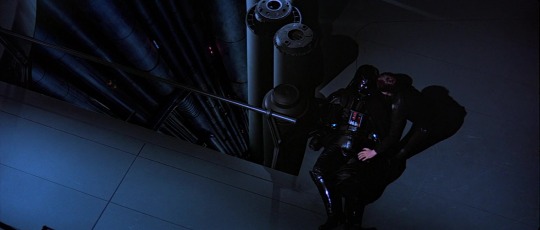
It's essential to understand that genuine compassion is to abandon such hierarchical thinking, not the reversal of the hierarchy, that is to discriminate toward the people we have close, compassionate, loving and trusting and personal relationships for the sake of the people we have adverse or no relationship at all. Nor does genuine compassion allow for lowering the love, care and commitment we have for those close to us, or to forego such relationships, that is trying to avoid discriminating based on feelings of distance and closeness, by not getting close to anyone. In many ways, that's more unwholesome. Genuine compassion is horizontal: the realization that all living things want to be happy and doesn't want to suffer, just as intensely as we and our loved ones are, allows compassion, the wish for others to be happy and not to suffer, to spread effortlessly, evenly, inexhaustibly. Indifference is to say, "I care no more for my mother than I care for a stranger", compassion is to say, "I care for this stranger no less than I care for my mother." In Buddhism, indifference is the "near enemy" of non-attachment: it's mimicking it, but it pushes us into suffering.
The Fall of the Galactic Republic: Fallen Symbiosis
The Balance of the Force
George Lucas' Star Wars story is essentially about the loss and restoration of the balance of the Force. Although there are many interpretations on this concept, Lucas himself was very clear on that balance of the Force means keeping our selfishness under the check of our selflessness and avoid falling to the dark side, which is greed and self-centeredness, and being compassionate instead, which is loving each other unconditionally and caring for each other. It's dual: when you find balance, you're a compassionate individual, you control your selfish side, and you can do a lot of good things; and when you have a group made up of compassionate individuals who control their greed, you can have a symbiotic circle, which is the balance of the two sides of the Force at large, of the galaxy itself, that is selfishness being under the control of selflessness, and people come together to be as one, cooperating.
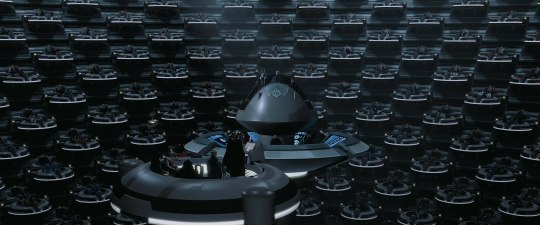
The central conflict of George Lucas’ Star Wars story is the loss of balance and the fall of a symbiotic relationship. The Galactic Republic is the galaxy forming a symbiosis, following the horizontal paradigm, existing in balance; the loss of balance is the shift from the horizontal love paradigm to the hierarchical one. "The Republic is not what it once was. The senate is full of greedy, squabbling delegates. There is no interest in the common good" and it "no longer functions" as it was said it Episode I, and as Lucas tells us, it's because "the Senators have fallen out of the symbiotic circle” and “they couldn’t agree on anything because their interests became so divergent, so they couldn’t get anything done as a Republic.” It's crucial to understand that although it's very popular to declare that the problem was the Senate, therefore, the Jedi Order was supposed to stop serving it, the issue depicted in Lucas' Star Wars is far worse and roots deeper than that. As corrupt and dysfunctional the Senate become, it was made up of senators who were elected directly or indirectly by the people of the member worlds. And as Ahsoka teaches the youth of Mandalore in Clone Wars, "citizens must be vigilant so corruption can't take root" and "it's every citizen's duty to challenge their leaders, to keep them honest and hold them accountable if they're not. Lasting change can only come from within." The horizontal love paradigm was declining in the entire galaxy, with individuals no longer operating as a group, no longer running their democracies, slowly drifting towards the hierarchical paradigm, which eventually erupted in the Separatist movement and the Clone Wars, resulting in the galaxy's fall to the dark side: the Galactic Empire. As Lucas summarizes the fate of the Republic: "well, the people gave it away." One of the core reasons why the "Jedi lost their way" theory gained a foothold is because the people are very much troubled by this notion, since it reveals that they have all the responsibility for maintaining democracies.
Understanding the Hutts and Hutt Space

The existence of slavery at the Outer Rim is the result of the gradual decline of the Galactic Republic. Tatooine is an out of the way, small, poor, sparsely populated planet on the outer rim of the galaxy, the home of the Jawas, the Sand People, scavengers and moisture farmers, controlled by the Hutt families who are vile galactic gangsters. It's part of the galactic underworld, where the anti-slavery laws of Republic, that are, as Padmé says, outlawing slavery in the entire galaxy, are not respected. As Shmi states, "The Republic doesn't exist out here. We must survive on our own." On Tatooine, the Republic's currency has no value, as people want "something more real", like ships, pods or slaves or "wupiupi" which is most likely made of something that has value on its own. Being the den of a powerful crime lord, the planet's spaceports, where slavery thrives, are "havens for those that don't wish to be found" and a "wretched hive of scum and villainy" - it's no surprise that in the cities grown around them, holding others hostage for economic gains or pleasure, which is against the laws established by the Galactic Republic as well, is part of everyday life. Hutt-controlled Tatooine is not a "slave state" as opposed to the "free states" of the Galactic Republic, like in the pre-1865 USA, nor it's an entity that shares borders with the Republic. In truth, Hutt Space, and everything within its borders can be paralleled only to those areas of Sudan, Liberia, Sierra Leone, Uganda, Congo, Niger and Mauritania, where the government has no effective control, and slavery is still alive and well in 2023. Although Jabba and the others are usually addressed respectfully, they're universally regarded as "criminals" or "vile gangsters." When Palpatine says, they must reach an agreement with Jabba, Mace Windu replies: "I don't like this, dealing with that criminal scum. This is a dark day for the Republic."
The Jedi Order: Guardians of the Waining Light
The Jedi Order was well aware of that the Force is out of balance. As Lucas says, "[Dooku] carries the sympathies of most of the Jedi, which is that the senate is corrupt and it's incapable of carrying on any meaningful action, because they argue about everything all the time" however, restoring lost balance cannot be done through force, only through bringing compassion and sanity back to the Senate and the galaxy. Many who believe, the Jedi Order had lost its way, argue, the Jedi Knights failed as guardians of peace and justice, neglected their duties and turned their backs on the most vulnerable - however, such allegations are founded on the idea that they were supposed to be the ones in the universe who erase injustice, conflict, and wrongdoing. It's very important to remember that the Jedi Knights, as they state it repeatedly throughout the Saga, are "keepers of peace, not soldiers" and "not warriors." Even though the Jedi Knights were inarguably very good warriors, in Episode II, it was illustrated powerfully that they cannot win on the battlefield. "A lot of people say, 'What good is a lightsaber against a tank?' The Jedi weren’t meant to fight wars. That’s the big issue in the prequels" Lucas reminds us. "If they do have to use violence, they will, but they are diplomats at the highest level" and "they don't kill people. They don't fight," and they "weren't mean to fight wars." If they Jedi would've decide to wage a war on the Hutts, the war would've siphon off Jedi Knights, neglecting the rest of the galaxy and they’d have lost, most of them killed, making things even worse.
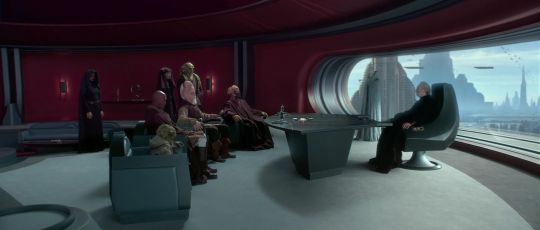
The essential difference between a Jedi Knight and a superhero is that superheroes are fundamentally god-like individuals who fight our battles for us: they topple dictators, stop corrupt politicians and greedy companies, they fend off armies, stop us from destroying ourselves. A Jedi Knight cannot and won't do that. As George Lucas says, "[the Jedi Knights] were never designed to be a superhero or anything like that. They were designed to be a Buddhist monk, who happened to be a very good warrior." Whenever they're do involved in battles, they do so in order to protect key figures who're able to unite their people against the forces of greed and destruction, like Padmé Amidala, both Queen and Senator, and Duchess Satine. They worked closely with the Chancellor of the Republic, especially with Palpatine, who promised to fight off corruption in the Senate and lead the galaxy toward a better future. They are “monk-warriors” who are “monks first, and they try to convince people to get along.” They’re “ultimate father figures” and “intergalactic therapists” and “warrior-monks who keep peace in the universe without resorting to violence.” They are heavily reliant on compassionate, democratic, thus strong galactic community, the ever-growing symbiotic circle, to guard peace and justice: the Jedi Order needed the Republic, and later, the Rebellion, to succeed. And they had reassurance that the lost balance will be restored: it was prophesied that the Chosen One will come and bring balance to the Force.
Horizontal Love, Anakin Skywalker and the Jedi Way
Widely popularized ideas are that the reason why Anakin is not going back to Tatooine to free Shmi, is because he was forbidden by the Jedi Council to do so; he expected something fundamentally different regarding the Jedi teachings, or their way of life, their limitations or the way how they operate - however, these ideas are not just lacking any rational basis in the actual story, but also wildly contradictory to Anakin's portrayal. In truth, all these assumptions are stemming from fans conflating their own expectations and perceptions regarding the Jedi Order with how Anakin and other characters are actually viewing them, and/or the desire to see the hierarchical love paradigm being affirmed by Star Wars.
"I had a dream I was a Jedi. I came back here and freed all the slaves"
In Episode I, Anakin Skywalker is a very compassionate, very selfless and very good kid, who gives without a thought of reward and know nothing of greed, who dreams of becoming a Jedi Knight, and he is very clearly thinking along the lines of the horizontal model of love. He tells Qui-Gon, "I had a dream I was a Jedi. I came back here and freed all the slaves. Have you come to free us?" which clearly shows that he considers himself as part of a team, encompassing all the slaves in Tatooine, and in his mind, a Jedi Knight is not only freeing his mother and friends, the people he's close with, but everyone. When he is about to leave with Qui-Gon to actually become a Jedi Knight, he vows, “I will come back and free you, mom” and we know that he plans to achieve this by making his dream come true.
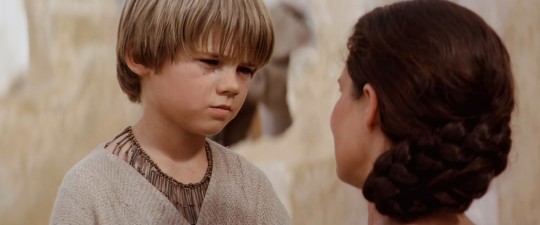
Anakin's situation is the same as Padmé's in Episode I: while Naboo is invaded and its people are tortured, Padmé does not establish a hierarchy between the well-being of her loved ones and the well-being of the rest of the Naboo, but decides to go with Qui-Gon to Coruscant to ask the help of the Senate, which was supposed to be the quickest, easiest and most effective way of freeing her planet. Anakin leaves with Qui-Gon for the Jedi Temple at the heart of the Republic, to become a Jedi Knight, to become the hero who will return and bring freedom to his mother and all of the slaves.
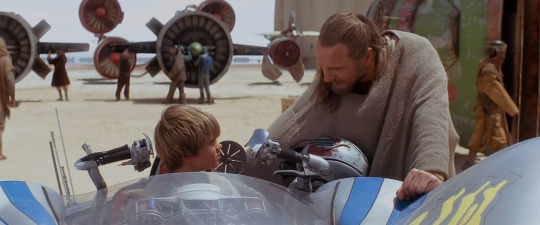
It's to be noted that even though a portion of the Star Wars fandom criticizes the Jedi Knights for not ending slavery on Tatooine or not trying to free at least Shmi, accusing them with indifference or failure to do their duty to guard peace of justice, Anakin Skywalker himself doesn't hold these opinions. He knows that a Jedi Knight brings peace and justice, and his expectations that as one of them, he will free his mother and all the slaves, is realistic: the anti-slavery laws of the Republic are outlawing slavery in the entire galaxy, and in the past, with a functioning Republic, the Jedi Order dismantled the slave empire of Zygerria, enforcing the laws, guarding peace and justice. It's very important to notice, that even though he believes, "no one can kill a Jedi", it never once occurs to him to cast stones on Qui-Gon or the Jedi Order for the conditions on Tatooine - he's offering his help so they can leave the planet and continue their journey to Coruscant as soon as possible. Never once suggests that they should go to battle against the slavers, or use violence against them, not even when he realizes that Shmi must stay on Tatooine. All this clearly shows, he understands and adheres to the Jedi way. Even more so, the only thing that Anakin is shown to be wrong about the Jedi Knights was his belief, "no one can kill a Jedi" - never once he gives any reason for us to believe that he expected something fundamentally different regarding the Jedi teachings, or their way of life, their limitations or the way how they operate. It should be noted that it's not the Jedi Order, but the Republic, what he becomes more and more frustrated with: in Episode II, he admits, "I don't think the system works," believing, if the people can't agree on what's the best for the most people, "Well, then they should be made to."
Anakin's Decision and the Circumstances on Tatooine
Part of the problem is that slavery is a very emotionally charged issue to discuss and for some, this may result in a quite misguided assumption: the fact, Anakin and Shmi were enslaved, means, the mistreatment of the slaves of ancient times, the torture and brutal dehumanization of enslaved black people in the southern U.S. as well as the suffering of victims of modern day slavery, are all integral part of their lives on Tatooine. Oftentimes, it's founded on the belief that their enslavement indicates, signifies, represents slavery in general, thus, it must be viewed, imagined, discussed through the historical, cultural, political and social parameters in which the Atlantic slave trade, how it relates to the U.S. and the West as a whole, is central. However, such approach is highly problematic: the type of slavery they were subjected to, lacked, and therefore wasn't the offshoot of the dehumanizing brutality of racism. In George Lucas' Star Wars story, slaveholders were shown to recognize differences between species, but they collapsed those differences to the consideration: “the weak deserve nothing more than to kneel before the strong, bound to our service.” This type of slavery obviously can, and often will result in brutal, inhuman treatment, but it's crucially important to acknowledge that just like Ancient Greek, Roman and Egyptian slavery was very different from the type of slavery in the southern U.S., slavery in Star Wars also has different political, cultural and social aspects and it must be examined and discussed accordingly.
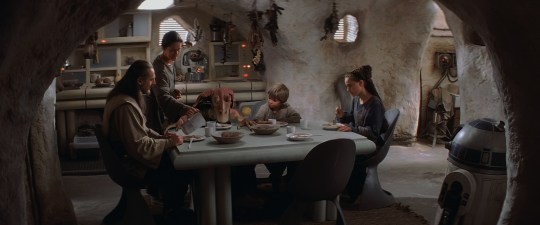
In Episode I, the Skywalkers were shown to lead a life similar to a serf - they lived independently from their slaver, owned personal property and money, were able to negotiate transactions, had considerable freedom in their daily lives. Anakin was shown to feel safe to talk back to Watto, to declare, he won't let himself being defined by his status as a slave, to speak his mind and to confront Sebulba, or to discuss his plan to locate his transmitter and escape, with strangers, and it was shown that a slave is expensive enough that the prospect of having to pay for it, stopped someone as aggressive and hateful as Sebulba from harming Anakin. Although Watto didn't seem to be bothered by promising Anakin to Qui-Gon, which could indicate that it was accepted to split families, it's worth to consider that Watto believed his win to be a fact, thus Anakin will remain his slave, and that he knew that Qui-Gon is from somewhere where the Republic enforces its laws, which explains, why he's not surprised at all when Qui-Gon says, since he won the bet, Watto must release Anakin, rather than transferring ownership.
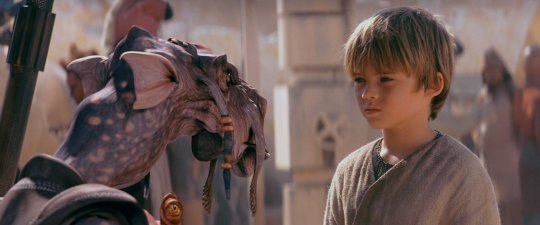
It would be important to note that when he left Tatooine, the cause of Anakin's distress was that he will be on his own and without his mum, missing her, and he become afraid of losing his mother; one must realize that's different from and not the same as being afraid for her life and being worried for her wellbeing. In Episode II, he states, he doesn't understand, why he would have nightmares about her, and when he realizes that he's having premonitions, and returns to Tatooine, his behavior toward Watto is quite friendly, rather than jumping to the conclusion that it must be his former slaver, who harmed Shmi. In fact, George Lucas indicated, Anakin and Watto's reunion in Episode II is analogous to visiting old high school teachers as young adults. What this tells us is that the slaves of those who could very easily afford new ones - such as Zygerrian nobility and Jabba the Hutt - lived a particularly brutal existence, however, most of the enslaved were able to lead a hard, but relatively normal and relatively safe life. Thus, even though Shmi wasn't left in the best circumstances, those circumstances allowed Anakin to leave with the certainty that he will be able to save her.
The Dark Side of "they could've free at least Shmi!"
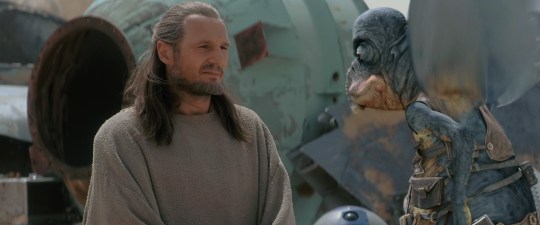
Those people who attach special importance and urgency to Shmi's freedom and insist, Qui-Gon and the Jedi Order was obligated to at least free her, are do so because they like her and they believe she deserves it, or for some, it's Anakin whom they like and therefore they don't want him to be sad without his mum. It's generally unsaid and not even conscious, this type of reasoning postulates that you can and actually, you should arrange people's right to be free into a hierarchy, with those who meet with your standards of goodness who you're close to, or who would make someone you like happy, are enjoying priority over those who you think aren't nice or have no relationship with. Helping those slaves, as this logic goes, is less urgent, they can and they should endure slavery for a bit longer, until the most or more deserving ones are freed. It shouldn't be hard to see, how this way of thinking is actually the flip-side of the way of thinking that condones the institution of slavery, nothing more, nothing less. We have a strong tendency to prioritize the wellbeing of the people who are close to us, who make us feel good, to consider the suffering of people who made us feel bad as well-deserved, to be less concerned, indifferent toward those who we have no relationship at all. But, this tendency is a flaw and it would be important to notice, this is not what Anakin and Shmi would want.
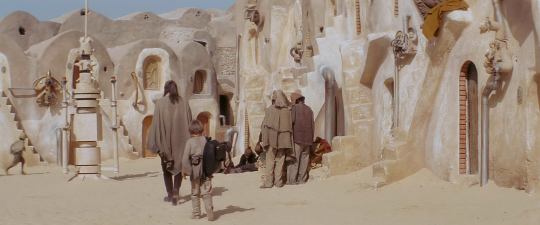
George Lucas’ Star Wars story doesn’t tell us that a non-violent method is the only possible response to injustice and wrongdoing, however, it’s important to point out that this doesn’t mean that it’s ever right to intentionally harm another - but in order to achieve greater benefit for a greater number of people, or when there is no other way to save the defenseless against the aggressor, or it’s an either you or them situation, you can certainly use a violent method. If we examine the situation, killing Watto doesn’t meet with these requirements - it has to do more with the desire to inflict harm upon him or the urge to hit out of those who’re outside of the circle of our personal relationships. Threatening Watto with a lightsaber wouldn’t be as harsh as killing him, but there is no way of preventing him from crying for help - unless killing him - and that would lead to even more killing, not to mention that chances to leave the spaceport would shrink greatly. Therefore, these aren't wholesome responses, and it should be clear why Shmi and Anakin, although he believes, "no one can kill a Jedi," never once suggests that Qui-Gon should go to battle against the slavers, or use violence against them, not even when he realizes that Shmi must stay on Tatooine as Watto's slave, he does not cast stones on him or the Jedi Order for not going to Tatooine to save her. He clearly adheres to these principles in Episode II when he sneaks into the Tusken camp, rather than massacring his way to his mother, but when she dies, out of anger and hate, he wipes them out to avenge her, and in the Clone Wars, he slowly, but steadily becomes more and more willing to kill his opponents, even when he has other options.
A note on Qui-Gon Jinn
Sometimes, Qui-Gon Jinn is accused with being indifferent and ungrateful for not freeing Shmi Skywalker, but, once all unexamined assumptions about the Jedi Order are cleared away, once the dark side of the "they could've save at least Shmi!" is acknowledged, we must realize, Qui-Gon takes Anakin to the Jedi Temple, because he realized, he discovered the promised Chosen One - making him a Jedi Knight, a guardian of peace and justice, giving him the proper training and upbringing to fulfill his destiny, would restore balance to the Force: selfishness under the control of selflessness, people are together as one, cooperating, the Republic functioning enforcing its laws and principles, ending slavery, as it did in the past.

When Shmi asks him, whether he is able to help Anakin to escape slavery, Qui-Gon replies, "I don't know. I didn't actually come here to free slaves." It become popular to assert, this somehow must mean that Qui-Gon is not interested in or he is not intending to free slaves, however, simply no compelling rational basis exists for this assertion. Qui-Gon Jinn is not on Tatooine to free slaves, he was forced to land on the planet ruled by a crime lord, in the middle of a mission to escort a queen who must save millions, to the capital, and he is in desperate need of help. The reason slavery exists in the galaxy is because the Republic no longer functions and fails to enforce its anti-slavery laws. Misinterpreting and misrepresenting these facts is grounded on ingrained mistaken assumptions. In addition, there are those in whom the words, "I didn't actually come here to free slaves" are triggering an emotion that, overthrowing reason, demands them to react with "if he is not on Tatooine to free slaves, he doesn't want to tear down the system!" Which, of course, lacks any sane basis.
The Life and Fate of Shmi Skywalker - the Problem with "Deserving"
It was Shmi Skywalker who taught her son, "the biggest problem in this universe is nobody helps each other." She, just like Anakin, gave without the thought of reward and was full of compassion: despite she was a slave on a world made of dust, Shmi had unwavering commitment to, and raised her son in the spirit of the horizontal love paradigm, was willing to offer refuge to strangers in her home and sharing her meal with them, and was willing to let her son go, so he can become a guardian of peace and justice in the entire galaxy.

Shmi Skywalker, just like her son, had no misconceptions about the Jedi Order and the galaxy: she didn't accuse Qui-Gon or the Jedi in general with failing their duties or being indifferent toward them, and even though she was well aware that the failing Republic abandoned her, she took no pleasure in the misery in the misfortune of Padmé and the others, but was willing to help and letting Anakin to help them. After Anakin left Tatooine to begin his Jedi training, Shmi was freed from salvery by Cliegg Lars, a moisture farmer who later married her. One day, when she was out in the morning gathering mushrooms, she was abducted by Tusken raiders, and she was subjected to brutal torture. Anakin returned to Tatooine to save her, but when they reunited, Shmi succumbed to her wounds and died in his arms. She didn’t ask her son to avenge her, she wasn’t bitter, hateful, angry, fearful. She was happy: “Now I’m complete” and she had nothing to say but, “I love you.” In Clone Wars, Anakin, referring to him wiping out the Tusken village out of revenge, claims "I failed as a Jedi, and I failed you" - implying that Shmi, taught him the same morals and ethics as the Jedi Order.
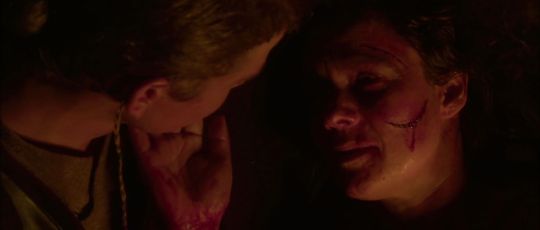
We tend to believe that the world is under the direction of a cosmic moral judge, rewarding good people and punishing bad people - for this, the fate of Shmi Skywalker is often deemed undeserved. From such notions, follows the idea that Qui-Gon Jinn or the Jedi Order was supposed to make sure that justice will be served for her, and what happened to her must be the result of that those, who were supposed to be agents of that cosmic judge, were failed to do their duties. However, the harsh truth is that, the probability of Shmi being abducted by Tusken raiders on Tatooine was the same as the probability of being murdered on any other planet, say, Coruscant. George Lucas' Star Wars presents a cosmos that is devoid of a cosmic system of reward and punishment, and attempts to blame her death on the Jedi Order is quite desperate. The life and death of Shmi Skywalker illustrates the lesson, life will do its own thing, it's not working as a mechanism by which the universe will bring good to good people, bad to bad people. We're interconnected, our lives are interwoven into each other, what happens to us is the product of the actions of others as well as our own, and determined by the degree of balance between selfishness and selflessness without ourselves as well as within others. The greed of Nute Gunray led to the invasion of Naboo and the death of Qui-Gon Jinn, but also led Qui-Gon to Tatooine, where he found Anakin. Shmi let her son go, and her action resulted in the liberation of Naboo, but a decade later, also the formation of the Empire, the destruction of Alderaan, and eventually the death of the Sith and the restoration of balance. Shmi being freed by Lars led to her death in a Tusken camp, Lars marrying Shmi led to his son dying by the hands of imperial storm troopers. All of existence is a vast nexus of causes and conditions, constantly changing, in which everything is interconnected to everything else. Shmi Skywalker illustrates, happiness is not in a reward-punishment system that distributes good and bad among living things based on whether or not they were good or bad. Tapping into her compassion, she was able to accept the reality of the ebb and flow of pleasure and pain of being alive, and was able to find an inexhaustible source of contentment, peace and joy, strength, determination and hope.
Sources:
Star Wars Archives 1999-2005
Star Wars: The Phantom Menace “Prime of the Jedi” featurette
George Lucas’ foreword for Shatterpoint by Matthew Stower
Interviews with George Lucas 1 2 3 4 5
George Lucas' audio commentary for his Saga
Star Wars Saga and Star Wars: The Clone Wars
Please note: I used no Disney or Legends Star Wars materials, (save for the one Shatterpoint foreword) - but I accept that others may found their own reading on them, thus, might come to different conclusions than I do.
#shmi skywalker#anakin and shmi#star wars#very long post#pro jedi order#jedi morals#compassion#attachment#qui gon jinn#slavery#tw slavery
284 notes
·
View notes
Text
You know what
I think it’s really sad the way we treat Dooku as a Jedi Master. Not as a Sith, fuck that guy; he fell to the dark side and he fell HARD. He is irredeemable in that respect.
I’m talking about Jedi Master Dooku, who only interacts with Qui-Gon Jinn in Legends and fanon (because in TOTJ he had already fallen and was actively taking steps towards the downfall of the Jedi/Republic and becoming the apprentice). *Even then, I don’t really respect TOTJ as canon because of the awful way it paints the Jedi, but I will concede it as canon from the perspective of Dooku as an unreliable narrator. I just hate THAT bit where he straight up THROWS Qui-Gon and force chokes a guy and GETS AWAY WITH IT because “uwu the Jedi awe bad and cowwupt and Dooku was a victim 👉👈”
I always hated that because Obi and Dooku meet for the first time in AOTC, then clearly Enlightened MaverickTM Qui-Gon (see my opinions on THIS in @antianakins beautifully worded post) must have been abused by his master and kept Obi-Wan away from him to “protect him from evil” yadda yadda yadda, whatever. That Qui-Gon specialised in Ataru instead of Makashi like his master because Dooku was EvilTM and Qui-Gon wanted to “get back at him” or “escape trauma” or some shit like that, never because it is perfectly normal for a Jedi to find their strength in a form that is different from their teacher’s (see Anakin, Obi-Wan, WINDU, Dooku himself).
Or that because Master Dooku wore relatively regal looking robes (again, the only canonical proof of this we have is in TOTJ and COUNT Dooku, AKA ruler of Serenno) then he had a taste for “the finer things in life,” words used by EVERY fanfiction author, and was always either straight up a Sith the entire time or, at the very least, a bad Jedi who followed his own rules like Anakin. I disagree.
It has NEVER been canonically established that Dooku was an abusive man. In fact, remember that the Jedi consider Dooku a FRIEND? Even in AOTC when Padme rightly accuses Dooku of attempting to assassinate her, they extend to him the benefit of the doubt. Because he was a Jedi Master. A good one. So good, in fact, that when he outright aligns himself with a faction looking to actively separate from the Republic and the Jedi, they trust that his judgement is that he is doing right by his people. Not that he is plotting a galaxy-wide takeover.

(Don’t even get me started on Ki-Adi Mundi, the voice of reason, frequently being abused by the fans just because SOMEONE had to say this line. Clearly he’s evil! He’s an idiot! He’s corrupt! *rolls eyes*)
But why then did Dooku never meet Obi-Wan as a padawan, you ask?
It HAS been canonically established that Obi-Wan is a powerful Jedi and a powerful diplomat even before he became The Negotiator (they wouldn’t send any run-of-the-mill padawan and master duo to dispute the Naboo conflict, they sent DIPLOMATS). And he is Busy As Fuck. Remember, as a padawan he spent a YEAR on the run with Satine and Qui-Gon. And if you were to accept the Melida/Daan and Bandomeer arcs from Legends as canon, that probably adds up to another YEAR spent away from the temple, NOT including recovery time after those periods because we don’t have any real basis for how long it takes a Jedi, or even just Obi-Wan, to bounce back from the physical, mental, and Force trauma induced by these hefty skirmishes. Don’t forget, in two of these instances, Obi-Wan is only 13-14, and in the other he’s presumably about 18. And bacta tanks aren’t a magical fix-all. They don’t heal starvation, extremely long-term physical neglect/hurts, just like they don’t grow back limbs.
Dooku was also probably busy as hell. It is very likely that the two teams were never in the temple at the same time, or if they were, they were probably busy. Like teaching their respective padawans (remember a master can have more than one padawan, just not at the same time, and now that I think about it, it is pretty odd we never (hardly ever?) canonically see masters who have clearly had more than one padawan in their lifetime). Or healing from traumas. Or hanging out with friends. Or researching, or writing reports, or literally ANYTHING that could make someone busy enough to forgo introducing a child to their grandmaster. I mean, how many times did you visit your grandparents as a teenager? Probably not very often compared to the big picture that is your life.
Why didn’t they meet when Obi-Wan was knighted, then? Well, TOTJ shows us that Qui-Gon’s death was at least a little traumatic for his master, and that was his last straw. Dooku left. And after that, he probably didn’t want to see the child Qui-Gon raised. The boy who got to hear his pseudo-son’s final words and who died IN HIS ARMS. We also have NO IDEA in canon exactly how many missions Obi-Wan and Anakin went on, nor how long they lasted, but we can guess that they were an extremely busy pair knowing Obi-Wan’s prowess in diplomacy PLUS the recent reemergence of the literal thought-extinct Sith PLUS the frankly horrific ratio of Jedi to Force Null beings in the galaxy (meaning there just aren’t enough Jedi to get around to all these places) PLUS teaching a rescued slave child with childhood memories of the outer rim the ways of the Jedi and core worlds. We also know that by the time of AOTC, Anakin being probably about 17-18, possibly on the cusp of 19 which is his Knighting age, the pair have been on at least 9 missions where Anakin had to rescue Obi-Wan. Knowing Obi-WAN’s skill and power, and that these missions most likely occurred when Anakin was old enough to do things like save Obi-Wan from a whole NEST of gundarks, this is NOT a common occurrence. Even if consistently in 1 of every 5 missions Obi-Wan has to be rescued by Anakin, that adds to at least 40 missions where he didn’t. That’s a lot of missions in a ten year span on top of all the other things Jedi have to do that aren’t considered missions, again, like teaching, attending functions, researching and learning because Jedi must be a wellspring of knowledge to successfully mediate/placate/please whomever it is they’re interacting with.
#star wars#obi wan kenobi#pro jedi#dooku#master dooku#qui gon jinn#yes this is an anti Anakin post#it’s subtle#but it’s there#star wars legends#star wars canon#melida/daan#tales of the jedi#attack of the clones#jedi appreciation#star wars prequels
105 notes
·
View notes
Text
Vague Obi-Wan lore from Bloodshed, Crimson Clover shitpost:
-----
Obi-Wan, eyes glowing, in an empty room: *talking in some ancient language no one can understand*
Some Random Jedi: ...is that not...concerning?
Qui-Gon: Last night I caught him floating on the ceiling and chanting ritualistically. When I asked what he was doing he told me that Master Katri was teaching him an old Je'daii mantra...so I consider this an improvement.
Some Random Jedi: ...isn't she dead?
Qui-Gon: Yes, which is why I will not be asking again.
BONUS:
Dooku, who literally just wants to eat and go to bed: *walks into his Temple quarters*
Obi-Wan:
Ḩ̸̡̬̝̰̤̺̜͎̩̾͆̏̿̔̐̈́ȩ̸̨̛̫̟̟͕̲̭̻̖̘̘̀͊͂̕͜͝ͅl̴̛̞̘͙̲̪̭̟͓̳̳̟̀ĺ̶̛͎̲̩͔̋̋̎̇͐̿̏̽̍͒̍̎͝ȍ̸̱͚̮̤̩͖̰̣̔͗̾̍̏̆ ̶̡̛̠̞̝̻̖͔̜̫̈́͜M̷̧̗̜͕̘͈͙̠̜̼̔͊̎͋̓́̒ͅa̴̺̜̫̻̠̻̭̯͉̣͖̮̠͒ͅş̷̘͓͔̟͎̈́́̉t̷̩͔͓̳̠͈̩͇̖͈̯̰͛̆̄͂̓̏͝e̸̱̜̾r̴̛͍͙ ̸̛̟̞̠̺͓̙̩͒̍͝Ḋ̵̛̼̯̘̗̖͗͌̃͋̿͝o̸̢͕̜̭͎̫̙͌́̿͊̈͛ͅo̵̹̼͚̻̫͓̻̳̻̭̳̐̅̉͑͆̊͂̔k̶̡̳͓͎͖͉͔̟̹̪̎̈̈́̇̒̈́͌̀̀̌̿̑͘��̼̣ū̶̬͎̀͒̊͑̽̀͘͝
Dooku, backing out the door: Nope...nope...not tonight...I'll room with Qui-Gon...just...hell no...
The real reason he was so ready to stab Obi-Wan in AotC
#the concept of baby Obi-Wan being the anti-christ as a child is hilarious to me#literally the only one who isn't off put by this is Yoda#everyone else is like “I love this boy but I'm now afraid of walking into dark rooms alone”#Mace: “I swear Qui-Gon had something to do with this”#Mace: “Obi-Wan was not an eldritch horror when I found him”#Qui-Gon: “I SWEAR I DIDNT DO ANYTHING THIS TIME”#Qui-Gon: “HES JUST LIKE THAT”#ao3 fanfic#codywan fanfic#codywan#fanfic#star wars#the clone wars#pro jedi#sw prequels#obi wan kenobi#mace windu#qui gon jinn#yoda#count dooku#jedi enthusiast's fanfics
1K notes
·
View notes
Text
EPISODE 3: DIM JEDI
Welcome to the Dim Jedi episode (shoutout to tumblr user @3piox for this joke) where we argue that Grey Jedi make no sense with George Lucas’s canon worldbuilding, and to prove it, we talk about why none of your faves are Grey Jedi (such Luke Skywalker, Ezra Bridger, Cal Kestis, etc).
#star wars#star wars podcast#grey jedi#jedi#pro jedi#qui-gon jinn#luke skywalker#kanan jarrus#ezra bridger#ahsoka tano#Spotify
42 notes
·
View notes
Text
Master-padawan relationships are so fascinating in their uniqueness.
Specifically in how unique each relationship is based on age difference between master and padawan.
Obi-Wan is 13 when he becomes Qui-Gon’s padawan, compared to Anakin’s 9. But Qui-Gon is in his late 30s compared to Obi-Wan’s mid-20s as a master. This means Obi-Wan’s relationship is closer to a father-son with his master, versus brotherly with Anakin.
Anakin and Ahsoka are even more like siblings, being so close in age (seriously, how was Anakin allowed a padawan at 19)
So some padawans are growing up with a parental figure. Others with more of a sibling.
The way this would change each Jedi is fundamental. We see this clearly with Obi-Wan compared to Anakin.
Undoubtedly, I also believe it would have impacted Anakin’s fall to the dark side.
It wouldn’t have prevented it (very little if anything could have; it’s what makes the prequels a tragedy) but with a father-figure- someone to reprimand him, to be more authoritative, etc.- perhaps he would have lent less heavily on Palpatine.
Perhaps he would have been guided more openly through his relationship with Padme (here I feel Qui-Gon would have been happy to actually talk about it)
Perhaps Anakin would have felt he could get away with less leading up to his fall. He would have tried harder to stick to the Jedi way- to emulate a father, rather than out-compete a brother.
And yet, equally, I think it could have made his fall all the more terrible.
Often, bitterness for a parent is so much heavier than for a sibling. Anakin would have killed Qui-Gon. He would have levelled so much blame on him. From a slightly different perspective, may even have fallen to the dark side sooner- driven there by resentment, by a need to prove himself.
Obviously, there are so many other factors at play that shaped the way Anakin turned out versus Obi-Wan, but I think their differing master-padawan relationships from an age perspective are hugely important.
What do you think?
(also, how would Ashoka’s life have been different if, say Obi-Wan, was her master?)
#i’m not blaming obi-wan#as i said i don’t believe anything could have prevented anakin’s fall#nor is this pro or anti qui-gon#i don’t really have any strong feelings in that regard#do you think other jedi could tell?#like how you can tell someone’s an only child#‘skywalker was *so* raised by a sibling not a parent’#‘the kid’s feral’#pro jedi#jedi#jedi council#star wars#jedi discourse#obi wan star wars#obi wan kenobi#obi wan and anakin#anakin skywalker#darth vader#light side#dark side#qui gon jinn#qui gon and obi wan#qui gon lives#palpatine
69 notes
·
View notes
Text
Where does that garbage about Qui-Gon and how he "unlike other Jedi/the Council, he listens to the will of the force" come from anyway?
Cuz A. Nothing says that in the films/shows
B. All Jedi believe in the will of the Force to some degree, it's just that what the Force's "will" is can be a bit of a guessing game
See, the thing is, Qui-Gon can't/doesn't listen to the will of the Force
The underlying assumption I see regarding Qui-Gon and his purported ability to "listen" to the Force's will is that he somehow does something (no one ever says what, just that he can do it) that makes it so the Force's voice is heard in his ear
But here's the thing, you can't just "listen to the will of the force" because

In yet another instance of people conflating the Jedi with christianity, they make the Force out to be the christian god whispering into the ears of his chosen, and Qui-Gon a prophet (he ain't)
Now (obviously) given that the Jedi draw heavily from Buddhism and Eastern philosophy (and maybe some Zoroastrianism? Would have to check), the Force too draws from Buddhist/Eastern ideas of the universe, and thus framing Qui-Gon and the Force in a christianic prophet-god context is incongruous to say the least
#wooloo-writes#wooloo writes#star wars#sw#pro jedi#in defense of the jedi#buddhism#on the force#the force#qui gon critical#anti qui gon
93 notes
·
View notes